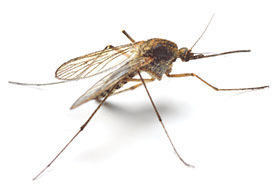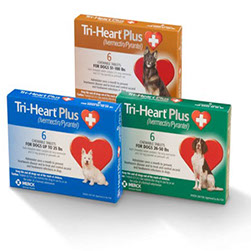What are Heartworms?
by Angela Steinley, DVM
Download this article:

Heartworms are parasites (Dirofilaria immitis) that live in the heart and the blood vessels of the lungs in dogs. Their life cycle is long and complex. Adult heartworms live in the heart and blood vessels of dogs and produce “babies” called microfilaria. These “baby” heartworms are carried through the blood stream. They can live in the dog for up to 2 years. When mosquitoes bite dogs not only do they drink the dog’s blood, but the baby heartworms as well.
Once inside the mosquito the baby heartworms further develop into what are called third stage larvae (L3). This development takes approximately two weeks. Once they are at the L3 stage they can infect other dogs. When the mosquito next bites a dog the L3 larvae infect the dog. The L3 larvae then spend the next 90-120 days traveling throughout the dog’s body and further maturing. They finally take up residence in the dog’s blood vessels of the lungs and the heart and become adult heartworms, producing babies of their own. The adult heartworms can live up to seven years. The average number of adult heartworms in infected dogs is 15, but can be many more in severe infections.
The real damage from heartworms comes from their living in the blood vessels and the heart. When they first reach the heart and lungs they are approximately 1-1.5 inches long.
Female heartworms can grow to become 10.6 inches long. Male heartworms can grow to 6.7 inches long. The worms cause inflammation and plug up the blood vessels. They also increase the chance of the dog developing a clot that can block vessels of the lungs or other areas of the body. Exercise increases the amount of damage that the worms cause. This is why it is recommended that heartworm positive dogs be kept very quiet and not allowed to run around. The amount of exercise a dog does is more important than the number of worms present. The heartworms can also cause liver and kidney failure.
Dogs are the main host for heartworms, but cats, ferrets, and other wildlife can become infected. Cats are more resistant to heartworm infection than dogs. They generally do not become infected with as many heartworms as dogs. However, there is no heartworm treatment for cats (the treatment used for dogs will kill cats.)
Testing
All dogs should be tested for heartworms before being started on a preventative. This is because if they are positive there could be severe reactions to the preventative.
A simple blood test can be used to tell if your dog has heartworms. It detects the female heartworm. Since most dogs have both male and female worms the test is very accurate. Cats can sometimes have infections of just one or two worms, so they may not test positive even if they have worms. It takes nearly six months for the heartworm larvae to mature into adults once they are in the dog. So if your dog is less than six months old it does not need to be tested before being started on heartworm preventative.
Heartworm positive dogs will almost always die without treatment.


Heartgard Plus by Merial
Monthly Chewable

Tri-Heart Plus by Merck
Monthly Chewable

Prevention
Pets should be started on heartworm prevention as soon as it is warm enough for mosquitoes to be out. They should stay on the preventative for one month past when mosquitoes are out (in southern climates this is year round). Heartworm preventatives work by killing “baby” heartworms (microfilaria, L3, and the younger stages of L4 larvae). Hence they work by killing the heartworms the dog may have been exposed to in the last month; this is why you need to use the preventative for one month past when mosquitoes are out. As an alternative you can keep your pet on heartworm prevention year round. Some people find this easier because you do the same thing each month and do not have to worry about stopping and starting. The preventative products are very safe and can easily be used year round. Another benefit to most of the heartworm preventatives is that they also kill most intestinal parasites (hookworms, roundworms, ect.) as well. If you live in a northern climate, but take your dog vacationing in the south during the winter they should be on preventative year round.
Heartworm prevention is easy and relatively inexpensive ($3-6 per month depending on the size of your dog and product used). Heartworm prevention comes in three basic forms, pills, topical products (you put on the skin), or a shot. The most common form used is a once a month pill. Several brands are available; Tri-Heart Plus, Heartgard Plus, Interceptor, and Sentinel are several examples. There are also several products that can be applied topically such as Revolution and Advantage Multi. These are applied by parting the dog’s hair and applying directly to the skin. Many of the topical products also treat fleas. One product, Pro-Heart 6, is a shot that will provide heartworm prevention for six months. One thing to keep in mind if you do the shot is that the heartworm season may be longer than six months so your dog may need more than one shot to be fully covered. The shot was taken off the market for a while, so it may not be easy for your veterinarian to get.
ProHeart6 by Zoetis
6-month injection
Yearly Re-Testing
It is recommended that you have your pet re-tested every year for heartworms. This is because if they are heartworm positive the preventatives can cause a bad reaction. Even if your pet has been on preventative year round it is recommended to re-test each year because if doses are not given on time every time it is possible for your dog to become infected. Also many companies have policies in place that if your dog gets heartworms while on their product they will pay for treatment, but only if you have a negative test before starting on the preventative.
Heartworm Treatment for Positive Dogs
Heartworm treatment is very expensive, dangerous, and can take many months. Dogs with heartworms will almost always die without treatment and can die during treatment. There is no treatment for heartworms in cats. See other fact sheet for specific treatment information.













